Emotional Intelligence Report: Self-Assessment, Leadership Analysis
VerifiedAdded on 2020/04/29
|18
|4775
|241
Report
AI Summary
This report provides a comprehensive analysis of emotional intelligence (EI), based on a self-assessment test and real-life scenarios. The student identifies their own EQ level, strengths, and areas for improvement, particularly in managing emotional triggers and improving communication. The report explores instances of emotional stress and how they were handled, including strategies for self-regulation and assertive communication. It delves into the distinction between emotions and moods, the importance of emotional management in the workplace, and the need for developing EI through strategies such as paying attention to emotions, improving non-verbal communication, and practicing empathy. The report also examines a case study of a store manager, assessing her leadership style, emotional intelligence principles displayed and not displayed, and provides recommendations for improving her interactions with staff, emphasizing the importance of motivational leadership, effective communication, and fostering a positive work environment. The report also touches upon the challenges of a diverse workforce and how effective coordination and collaboration can be achieved.
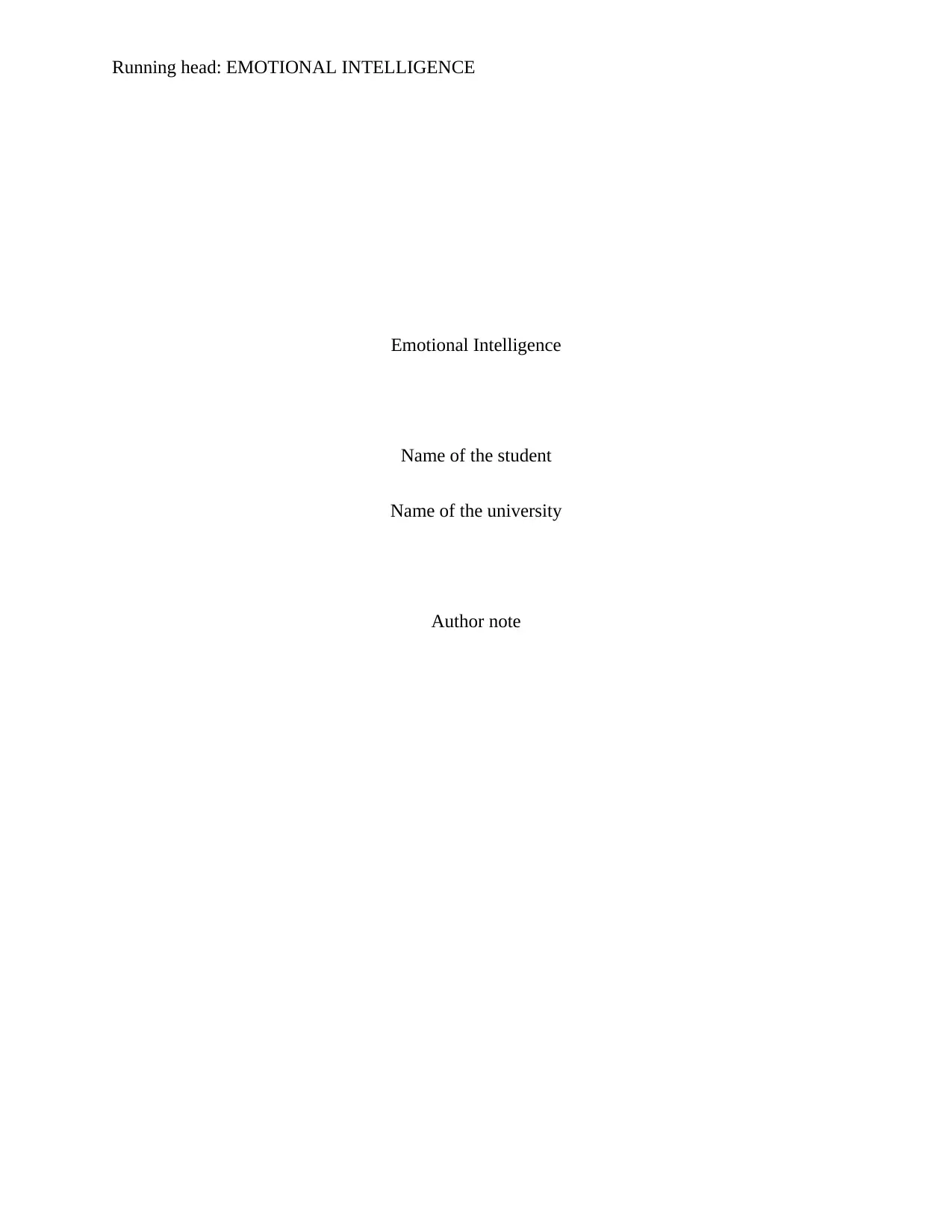
Running head: EMOTIONAL INTELLIGENCE
Emotional Intelligence
Name of the student
Name of the university
Author note
Emotional Intelligence
Name of the student
Name of the university
Author note
Paraphrase This Document
Need a fresh take? Get an instant paraphrase of this document with our AI Paraphraser
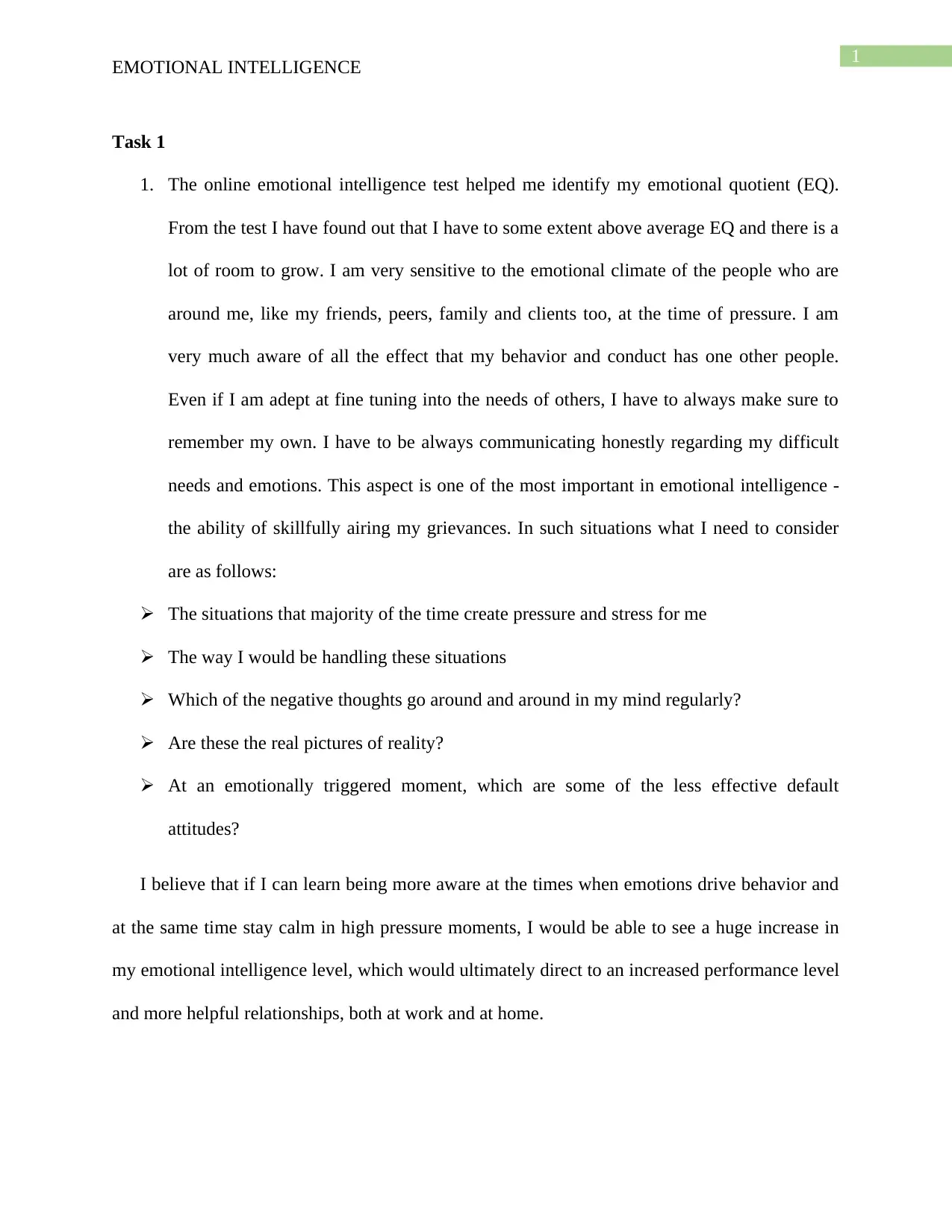
1
EMOTIONAL INTELLIGENCE
Task 1
1. The online emotional intelligence test helped me identify my emotional quotient (EQ).
From the test I have found out that I have to some extent above average EQ and there is a
lot of room to grow. I am very sensitive to the emotional climate of the people who are
around me, like my friends, peers, family and clients too, at the time of pressure. I am
very much aware of all the effect that my behavior and conduct has one other people.
Even if I am adept at fine tuning into the needs of others, I have to always make sure to
remember my own. I have to be always communicating honestly regarding my difficult
needs and emotions. This aspect is one of the most important in emotional intelligence -
the ability of skillfully airing my grievances. In such situations what I need to consider
are as follows:
The situations that majority of the time create pressure and stress for me
The way I would be handling these situations
Which of the negative thoughts go around and around in my mind regularly?
Are these the real pictures of reality?
At an emotionally triggered moment, which are some of the less effective default
attitudes?
I believe that if I can learn being more aware at the times when emotions drive behavior and
at the same time stay calm in high pressure moments, I would be able to see a huge increase in
my emotional intelligence level, which would ultimately direct to an increased performance level
and more helpful relationships, both at work and at home.
EMOTIONAL INTELLIGENCE
Task 1
1. The online emotional intelligence test helped me identify my emotional quotient (EQ).
From the test I have found out that I have to some extent above average EQ and there is a
lot of room to grow. I am very sensitive to the emotional climate of the people who are
around me, like my friends, peers, family and clients too, at the time of pressure. I am
very much aware of all the effect that my behavior and conduct has one other people.
Even if I am adept at fine tuning into the needs of others, I have to always make sure to
remember my own. I have to be always communicating honestly regarding my difficult
needs and emotions. This aspect is one of the most important in emotional intelligence -
the ability of skillfully airing my grievances. In such situations what I need to consider
are as follows:
The situations that majority of the time create pressure and stress for me
The way I would be handling these situations
Which of the negative thoughts go around and around in my mind regularly?
Are these the real pictures of reality?
At an emotionally triggered moment, which are some of the less effective default
attitudes?
I believe that if I can learn being more aware at the times when emotions drive behavior and
at the same time stay calm in high pressure moments, I would be able to see a huge increase in
my emotional intelligence level, which would ultimately direct to an increased performance level
and more helpful relationships, both at work and at home.
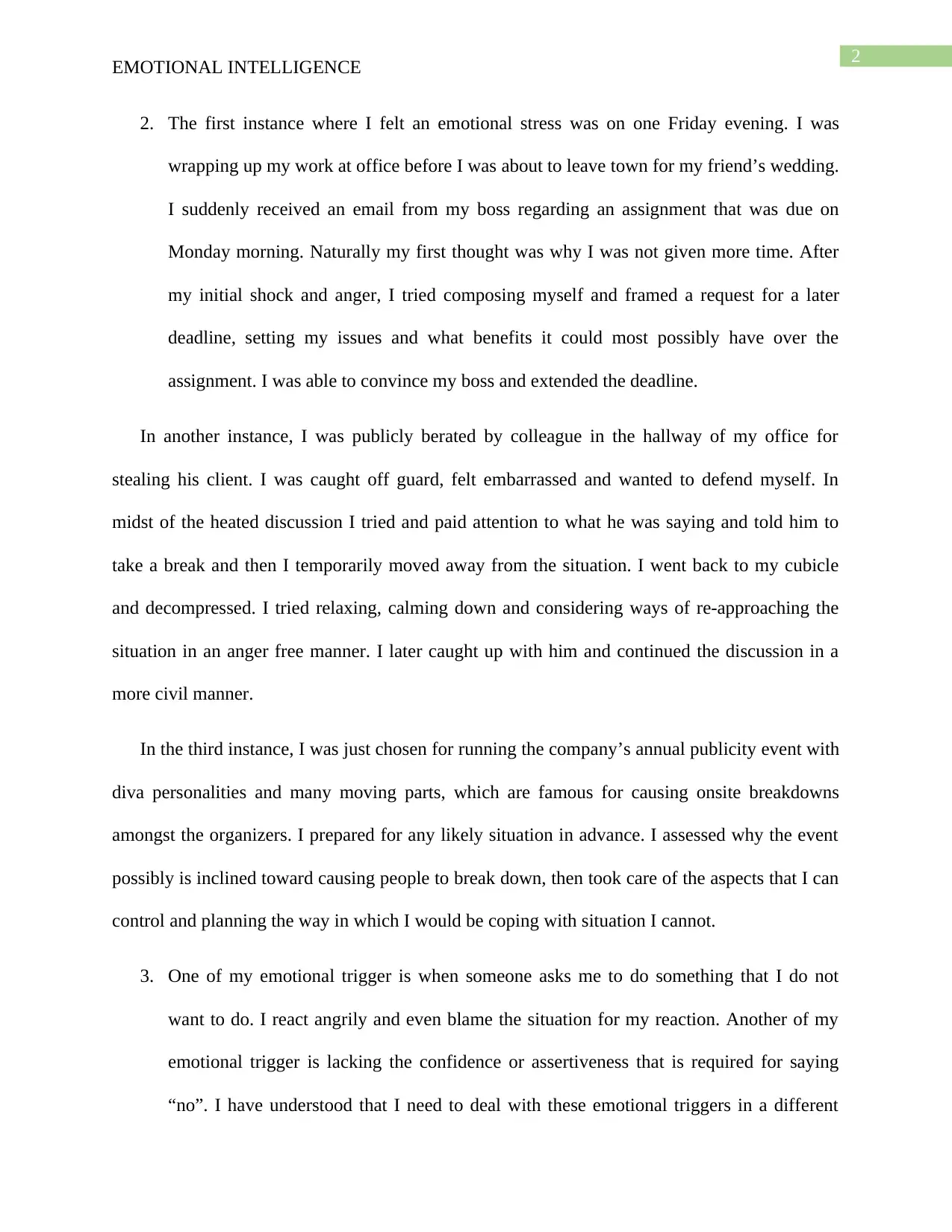
2
EMOTIONAL INTELLIGENCE
2. The first instance where I felt an emotional stress was on one Friday evening. I was
wrapping up my work at office before I was about to leave town for my friend’s wedding.
I suddenly received an email from my boss regarding an assignment that was due on
Monday morning. Naturally my first thought was why I was not given more time. After
my initial shock and anger, I tried composing myself and framed a request for a later
deadline, setting my issues and what benefits it could most possibly have over the
assignment. I was able to convince my boss and extended the deadline.
In another instance, I was publicly berated by colleague in the hallway of my office for
stealing his client. I was caught off guard, felt embarrassed and wanted to defend myself. In
midst of the heated discussion I tried and paid attention to what he was saying and told him to
take a break and then I temporarily moved away from the situation. I went back to my cubicle
and decompressed. I tried relaxing, calming down and considering ways of re-approaching the
situation in an anger free manner. I later caught up with him and continued the discussion in a
more civil manner.
In the third instance, I was just chosen for running the company’s annual publicity event with
diva personalities and many moving parts, which are famous for causing onsite breakdowns
amongst the organizers. I prepared for any likely situation in advance. I assessed why the event
possibly is inclined toward causing people to break down, then took care of the aspects that I can
control and planning the way in which I would be coping with situation I cannot.
3. One of my emotional trigger is when someone asks me to do something that I do not
want to do. I react angrily and even blame the situation for my reaction. Another of my
emotional trigger is lacking the confidence or assertiveness that is required for saying
“no”. I have understood that I need to deal with these emotional triggers in a different
EMOTIONAL INTELLIGENCE
2. The first instance where I felt an emotional stress was on one Friday evening. I was
wrapping up my work at office before I was about to leave town for my friend’s wedding.
I suddenly received an email from my boss regarding an assignment that was due on
Monday morning. Naturally my first thought was why I was not given more time. After
my initial shock and anger, I tried composing myself and framed a request for a later
deadline, setting my issues and what benefits it could most possibly have over the
assignment. I was able to convince my boss and extended the deadline.
In another instance, I was publicly berated by colleague in the hallway of my office for
stealing his client. I was caught off guard, felt embarrassed and wanted to defend myself. In
midst of the heated discussion I tried and paid attention to what he was saying and told him to
take a break and then I temporarily moved away from the situation. I went back to my cubicle
and decompressed. I tried relaxing, calming down and considering ways of re-approaching the
situation in an anger free manner. I later caught up with him and continued the discussion in a
more civil manner.
In the third instance, I was just chosen for running the company’s annual publicity event with
diva personalities and many moving parts, which are famous for causing onsite breakdowns
amongst the organizers. I prepared for any likely situation in advance. I assessed why the event
possibly is inclined toward causing people to break down, then took care of the aspects that I can
control and planning the way in which I would be coping with situation I cannot.
3. One of my emotional trigger is when someone asks me to do something that I do not
want to do. I react angrily and even blame the situation for my reaction. Another of my
emotional trigger is lacking the confidence or assertiveness that is required for saying
“no”. I have understood that I need to deal with these emotional triggers in a different
⊘ This is a preview!⊘
Do you want full access?
Subscribe today to unlock all pages.

Trusted by 1+ million students worldwide
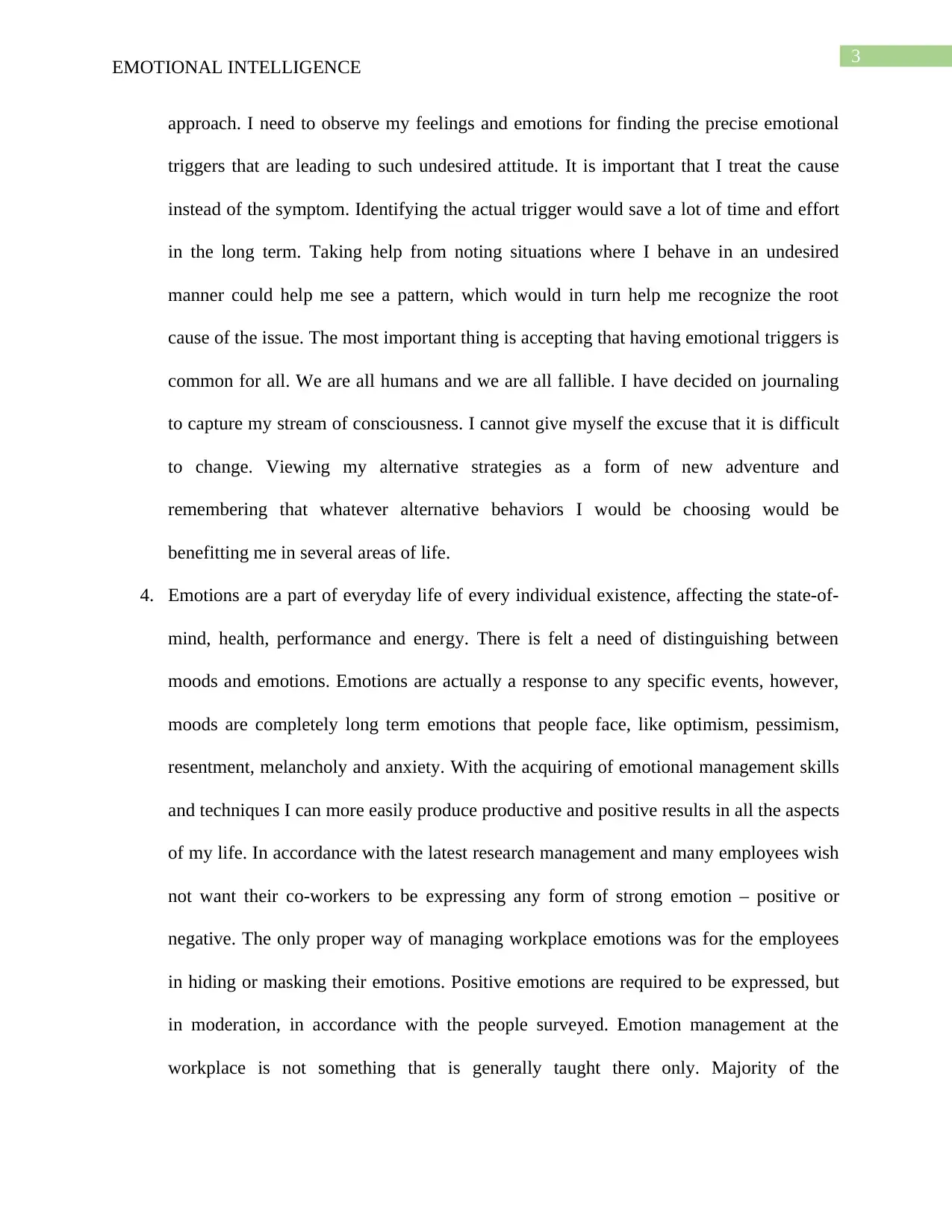
3
EMOTIONAL INTELLIGENCE
approach. I need to observe my feelings and emotions for finding the precise emotional
triggers that are leading to such undesired attitude. It is important that I treat the cause
instead of the symptom. Identifying the actual trigger would save a lot of time and effort
in the long term. Taking help from noting situations where I behave in an undesired
manner could help me see a pattern, which would in turn help me recognize the root
cause of the issue. The most important thing is accepting that having emotional triggers is
common for all. We are all humans and we are all fallible. I have decided on journaling
to capture my stream of consciousness. I cannot give myself the excuse that it is difficult
to change. Viewing my alternative strategies as a form of new adventure and
remembering that whatever alternative behaviors I would be choosing would be
benefitting me in several areas of life.
4. Emotions are a part of everyday life of every individual existence, affecting the state-of-
mind, health, performance and energy. There is felt a need of distinguishing between
moods and emotions. Emotions are actually a response to any specific events, however,
moods are completely long term emotions that people face, like optimism, pessimism,
resentment, melancholy and anxiety. With the acquiring of emotional management skills
and techniques I can more easily produce productive and positive results in all the aspects
of my life. In accordance with the latest research management and many employees wish
not want their co-workers to be expressing any form of strong emotion – positive or
negative. The only proper way of managing workplace emotions was for the employees
in hiding or masking their emotions. Positive emotions are required to be expressed, but
in moderation, in accordance with the people surveyed. Emotion management at the
workplace is not something that is generally taught there only. Majority of the
EMOTIONAL INTELLIGENCE
approach. I need to observe my feelings and emotions for finding the precise emotional
triggers that are leading to such undesired attitude. It is important that I treat the cause
instead of the symptom. Identifying the actual trigger would save a lot of time and effort
in the long term. Taking help from noting situations where I behave in an undesired
manner could help me see a pattern, which would in turn help me recognize the root
cause of the issue. The most important thing is accepting that having emotional triggers is
common for all. We are all humans and we are all fallible. I have decided on journaling
to capture my stream of consciousness. I cannot give myself the excuse that it is difficult
to change. Viewing my alternative strategies as a form of new adventure and
remembering that whatever alternative behaviors I would be choosing would be
benefitting me in several areas of life.
4. Emotions are a part of everyday life of every individual existence, affecting the state-of-
mind, health, performance and energy. There is felt a need of distinguishing between
moods and emotions. Emotions are actually a response to any specific events, however,
moods are completely long term emotions that people face, like optimism, pessimism,
resentment, melancholy and anxiety. With the acquiring of emotional management skills
and techniques I can more easily produce productive and positive results in all the aspects
of my life. In accordance with the latest research management and many employees wish
not want their co-workers to be expressing any form of strong emotion – positive or
negative. The only proper way of managing workplace emotions was for the employees
in hiding or masking their emotions. Positive emotions are required to be expressed, but
in moderation, in accordance with the people surveyed. Emotion management at the
workplace is not something that is generally taught there only. Majority of the
Paraphrase This Document
Need a fresh take? Get an instant paraphrase of this document with our AI Paraphraser
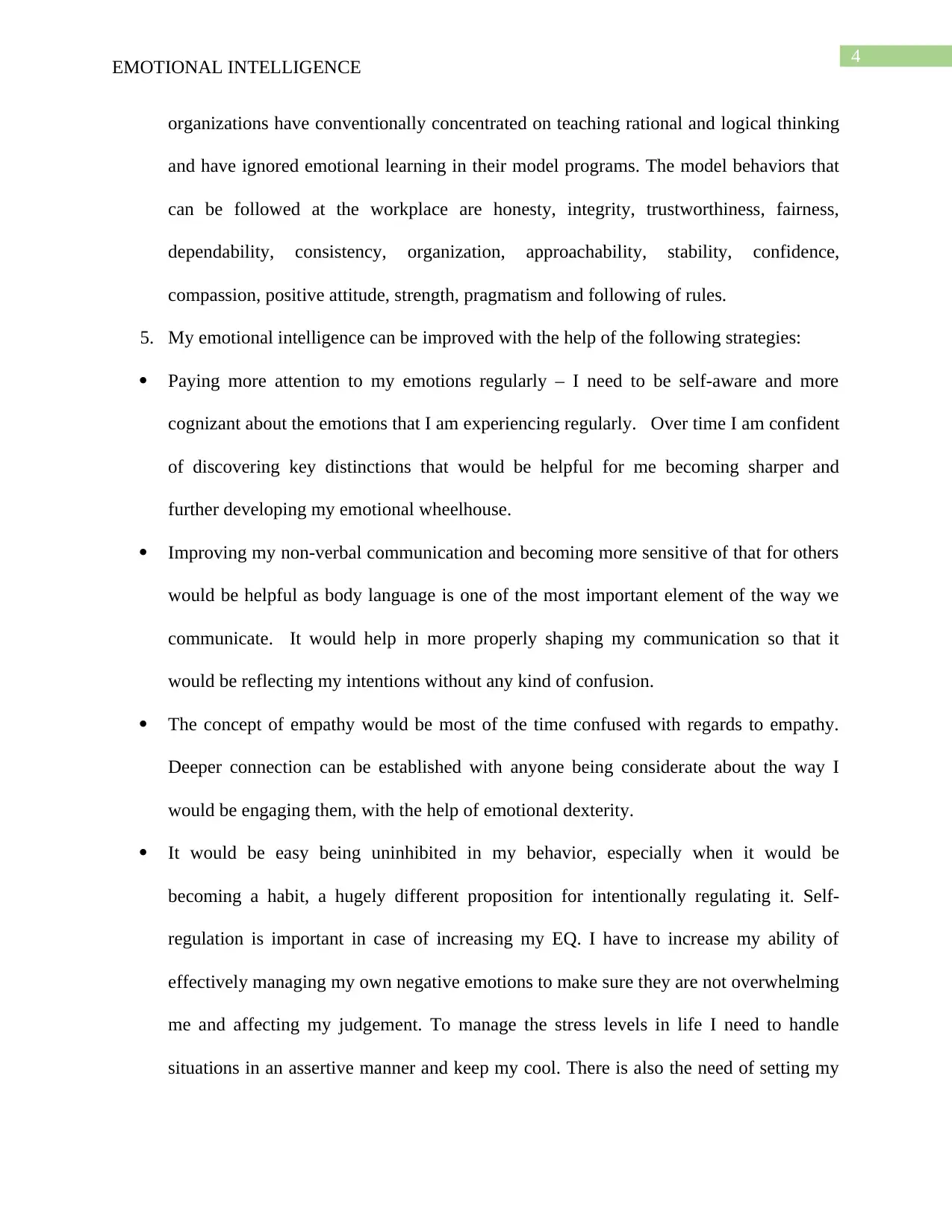
4
EMOTIONAL INTELLIGENCE
organizations have conventionally concentrated on teaching rational and logical thinking
and have ignored emotional learning in their model programs. The model behaviors that
can be followed at the workplace are honesty, integrity, trustworthiness, fairness,
dependability, consistency, organization, approachability, stability, confidence,
compassion, positive attitude, strength, pragmatism and following of rules.
5. My emotional intelligence can be improved with the help of the following strategies:
Paying more attention to my emotions regularly – I need to be self-aware and more
cognizant about the emotions that I am experiencing regularly. Over time I am confident
of discovering key distinctions that would be helpful for me becoming sharper and
further developing my emotional wheelhouse.
Improving my non-verbal communication and becoming more sensitive of that for others
would be helpful as body language is one of the most important element of the way we
communicate. It would help in more properly shaping my communication so that it
would be reflecting my intentions without any kind of confusion.
The concept of empathy would be most of the time confused with regards to empathy.
Deeper connection can be established with anyone being considerate about the way I
would be engaging them, with the help of emotional dexterity.
It would be easy being uninhibited in my behavior, especially when it would be
becoming a habit, a hugely different proposition for intentionally regulating it. Self-
regulation is important in case of increasing my EQ. I have to increase my ability of
effectively managing my own negative emotions to make sure they are not overwhelming
me and affecting my judgement. To manage the stress levels in life I need to handle
situations in an assertive manner and keep my cool. There is also the need of setting my
EMOTIONAL INTELLIGENCE
organizations have conventionally concentrated on teaching rational and logical thinking
and have ignored emotional learning in their model programs. The model behaviors that
can be followed at the workplace are honesty, integrity, trustworthiness, fairness,
dependability, consistency, organization, approachability, stability, confidence,
compassion, positive attitude, strength, pragmatism and following of rules.
5. My emotional intelligence can be improved with the help of the following strategies:
Paying more attention to my emotions regularly – I need to be self-aware and more
cognizant about the emotions that I am experiencing regularly. Over time I am confident
of discovering key distinctions that would be helpful for me becoming sharper and
further developing my emotional wheelhouse.
Improving my non-verbal communication and becoming more sensitive of that for others
would be helpful as body language is one of the most important element of the way we
communicate. It would help in more properly shaping my communication so that it
would be reflecting my intentions without any kind of confusion.
The concept of empathy would be most of the time confused with regards to empathy.
Deeper connection can be established with anyone being considerate about the way I
would be engaging them, with the help of emotional dexterity.
It would be easy being uninhibited in my behavior, especially when it would be
becoming a habit, a hugely different proposition for intentionally regulating it. Self-
regulation is important in case of increasing my EQ. I have to increase my ability of
effectively managing my own negative emotions to make sure they are not overwhelming
me and affecting my judgement. To manage the stress levels in life I need to handle
situations in an assertive manner and keep my cool. There is also the need of setting my
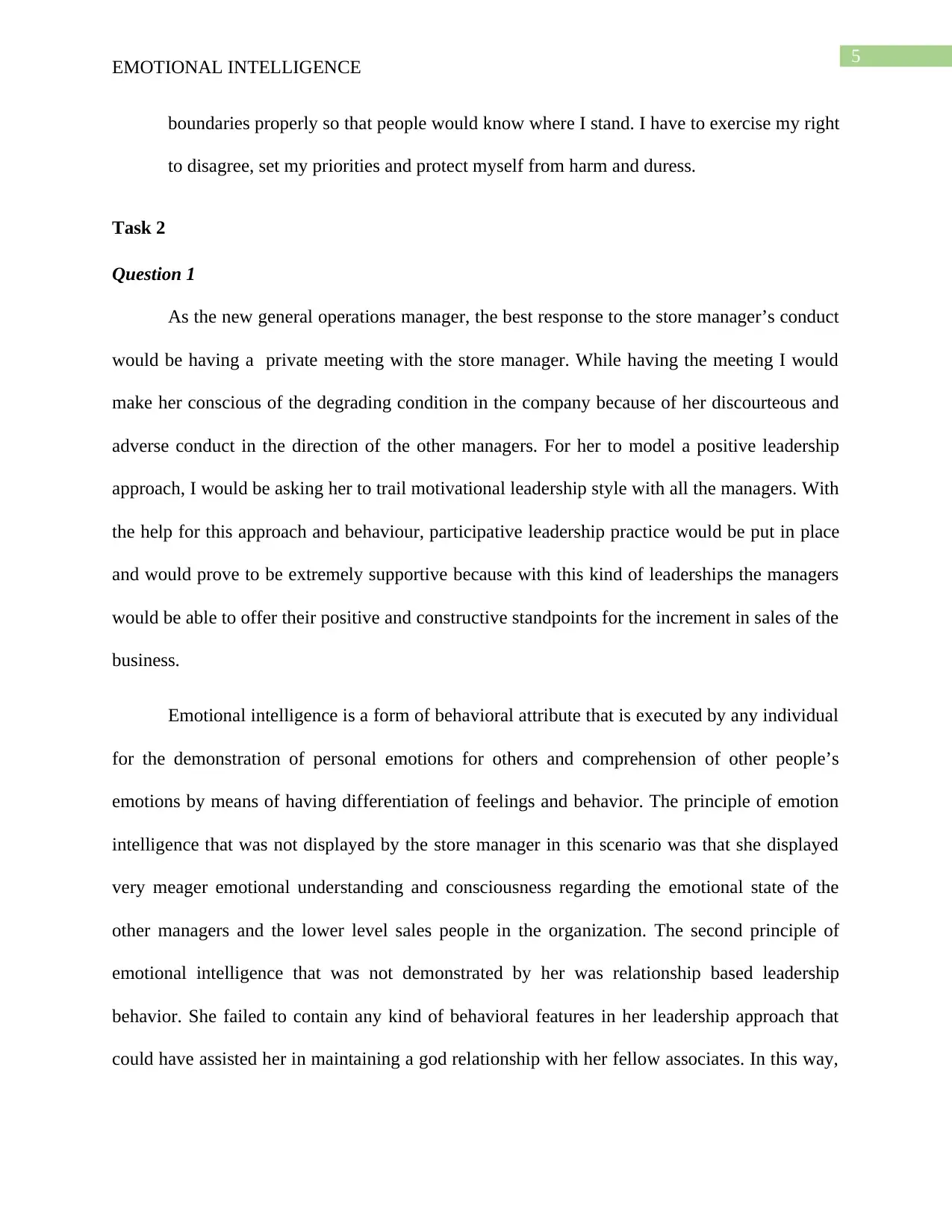
5
EMOTIONAL INTELLIGENCE
boundaries properly so that people would know where I stand. I have to exercise my right
to disagree, set my priorities and protect myself from harm and duress.
Task 2
Question 1
As the new general operations manager, the best response to the store manager’s conduct
would be having a private meeting with the store manager. While having the meeting I would
make her conscious of the degrading condition in the company because of her discourteous and
adverse conduct in the direction of the other managers. For her to model a positive leadership
approach, I would be asking her to trail motivational leadership style with all the managers. With
the help for this approach and behaviour, participative leadership practice would be put in place
and would prove to be extremely supportive because with this kind of leaderships the managers
would be able to offer their positive and constructive standpoints for the increment in sales of the
business.
Emotional intelligence is a form of behavioral attribute that is executed by any individual
for the demonstration of personal emotions for others and comprehension of other people’s
emotions by means of having differentiation of feelings and behavior. The principle of emotion
intelligence that was not displayed by the store manager in this scenario was that she displayed
very meager emotional understanding and consciousness regarding the emotional state of the
other managers and the lower level sales people in the organization. The second principle of
emotional intelligence that was not demonstrated by her was relationship based leadership
behavior. She failed to contain any kind of behavioral features in her leadership approach that
could have assisted her in maintaining a god relationship with her fellow associates. In this way,
EMOTIONAL INTELLIGENCE
boundaries properly so that people would know where I stand. I have to exercise my right
to disagree, set my priorities and protect myself from harm and duress.
Task 2
Question 1
As the new general operations manager, the best response to the store manager’s conduct
would be having a private meeting with the store manager. While having the meeting I would
make her conscious of the degrading condition in the company because of her discourteous and
adverse conduct in the direction of the other managers. For her to model a positive leadership
approach, I would be asking her to trail motivational leadership style with all the managers. With
the help for this approach and behaviour, participative leadership practice would be put in place
and would prove to be extremely supportive because with this kind of leaderships the managers
would be able to offer their positive and constructive standpoints for the increment in sales of the
business.
Emotional intelligence is a form of behavioral attribute that is executed by any individual
for the demonstration of personal emotions for others and comprehension of other people’s
emotions by means of having differentiation of feelings and behavior. The principle of emotion
intelligence that was not displayed by the store manager in this scenario was that she displayed
very meager emotional understanding and consciousness regarding the emotional state of the
other managers and the lower level sales people in the organization. The second principle of
emotional intelligence that was not demonstrated by her was relationship based leadership
behavior. She failed to contain any kind of behavioral features in her leadership approach that
could have assisted her in maintaining a god relationship with her fellow associates. In this way,
⊘ This is a preview!⊘
Do you want full access?
Subscribe today to unlock all pages.

Trusted by 1+ million students worldwide
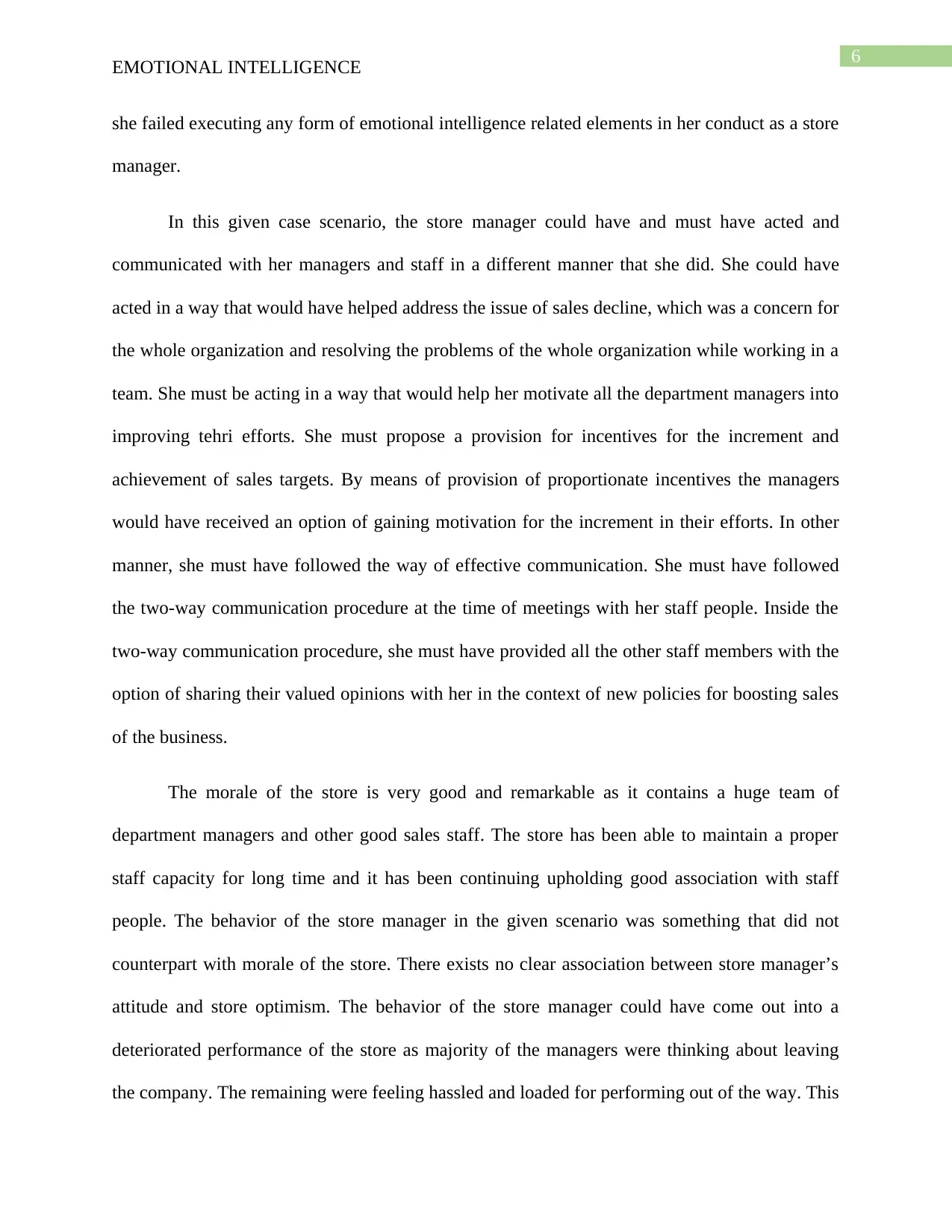
6
EMOTIONAL INTELLIGENCE
she failed executing any form of emotional intelligence related elements in her conduct as a store
manager.
In this given case scenario, the store manager could have and must have acted and
communicated with her managers and staff in a different manner that she did. She could have
acted in a way that would have helped address the issue of sales decline, which was a concern for
the whole organization and resolving the problems of the whole organization while working in a
team. She must be acting in a way that would help her motivate all the department managers into
improving tehri efforts. She must propose a provision for incentives for the increment and
achievement of sales targets. By means of provision of proportionate incentives the managers
would have received an option of gaining motivation for the increment in their efforts. In other
manner, she must have followed the way of effective communication. She must have followed
the two-way communication procedure at the time of meetings with her staff people. Inside the
two-way communication procedure, she must have provided all the other staff members with the
option of sharing their valued opinions with her in the context of new policies for boosting sales
of the business.
The morale of the store is very good and remarkable as it contains a huge team of
department managers and other good sales staff. The store has been able to maintain a proper
staff capacity for long time and it has been continuing upholding good association with staff
people. The behavior of the store manager in the given scenario was something that did not
counterpart with morale of the store. There exists no clear association between store manager’s
attitude and store optimism. The behavior of the store manager could have come out into a
deteriorated performance of the store as majority of the managers were thinking about leaving
the company. The remaining were feeling hassled and loaded for performing out of the way. This
EMOTIONAL INTELLIGENCE
she failed executing any form of emotional intelligence related elements in her conduct as a store
manager.
In this given case scenario, the store manager could have and must have acted and
communicated with her managers and staff in a different manner that she did. She could have
acted in a way that would have helped address the issue of sales decline, which was a concern for
the whole organization and resolving the problems of the whole organization while working in a
team. She must be acting in a way that would help her motivate all the department managers into
improving tehri efforts. She must propose a provision for incentives for the increment and
achievement of sales targets. By means of provision of proportionate incentives the managers
would have received an option of gaining motivation for the increment in their efforts. In other
manner, she must have followed the way of effective communication. She must have followed
the two-way communication procedure at the time of meetings with her staff people. Inside the
two-way communication procedure, she must have provided all the other staff members with the
option of sharing their valued opinions with her in the context of new policies for boosting sales
of the business.
The morale of the store is very good and remarkable as it contains a huge team of
department managers and other good sales staff. The store has been able to maintain a proper
staff capacity for long time and it has been continuing upholding good association with staff
people. The behavior of the store manager in the given scenario was something that did not
counterpart with morale of the store. There exists no clear association between store manager’s
attitude and store optimism. The behavior of the store manager could have come out into a
deteriorated performance of the store as majority of the managers were thinking about leaving
the company. The remaining were feeling hassled and loaded for performing out of the way. This
Paraphrase This Document
Need a fresh take? Get an instant paraphrase of this document with our AI Paraphraser
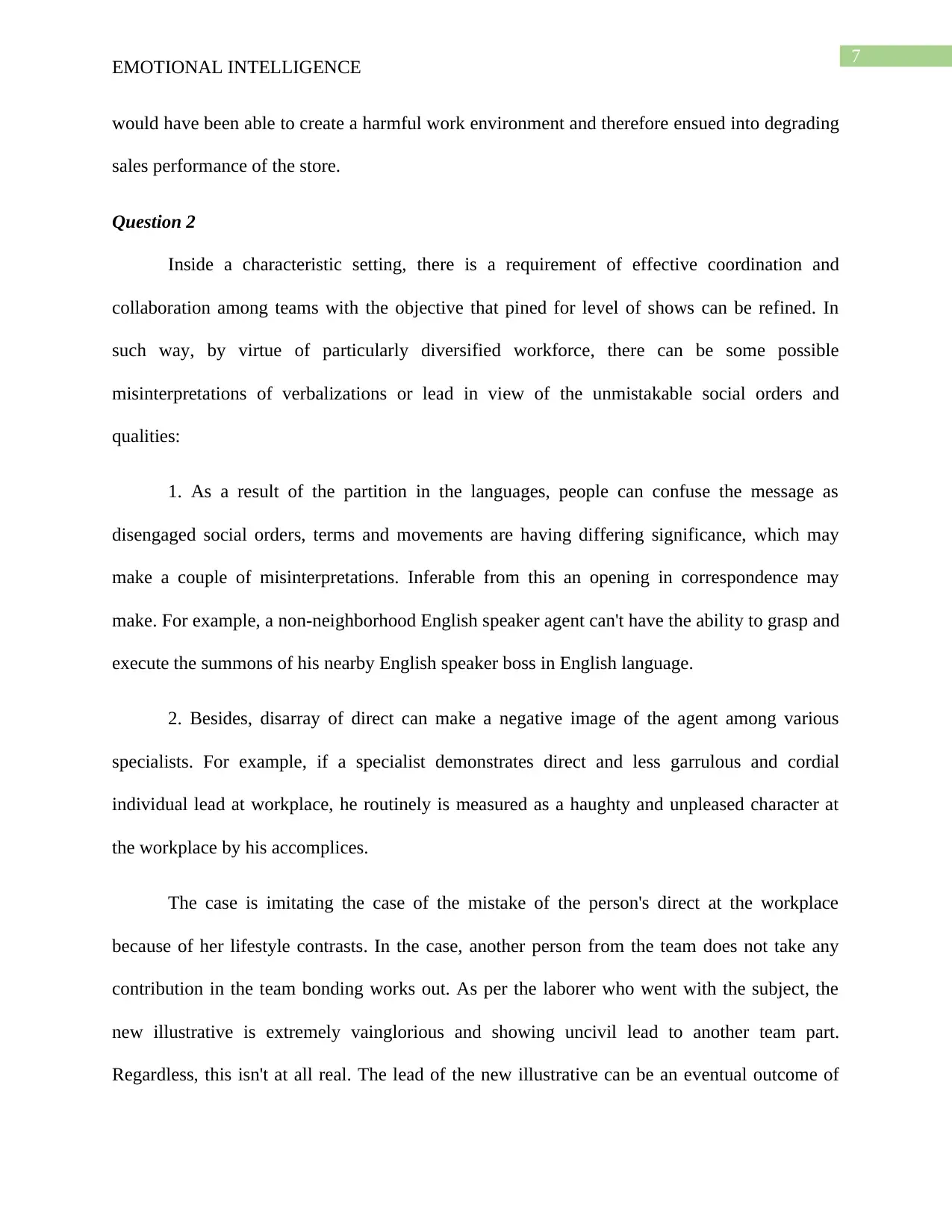
7
EMOTIONAL INTELLIGENCE
would have been able to create a harmful work environment and therefore ensued into degrading
sales performance of the store.
Question 2
Inside a characteristic setting, there is a requirement of effective coordination and
collaboration among teams with the objective that pined for level of shows can be refined. In
such way, by virtue of particularly diversified workforce, there can be some possible
misinterpretations of verbalizations or lead in view of the unmistakable social orders and
qualities:
1. As a result of the partition in the languages, people can confuse the message as
disengaged social orders, terms and movements are having differing significance, which may
make a couple of misinterpretations. Inferable from this an opening in correspondence may
make. For example, a non-neighborhood English speaker agent can't have the ability to grasp and
execute the summons of his nearby English speaker boss in English language.
2. Besides, disarray of direct can make a negative image of the agent among various
specialists. For example, if a specialist demonstrates direct and less garrulous and cordial
individual lead at workplace, he routinely is measured as a haughty and unpleased character at
the workplace by his accomplices.
The case is imitating the case of the mistake of the person's direct at the workplace
because of her lifestyle contrasts. In the case, another person from the team does not take any
contribution in the team bonding works out. As per the laborer who went with the subject, the
new illustrative is extremely vainglorious and showing uncivil lead to another team part.
Regardless, this isn't at all real. The lead of the new illustrative can be an eventual outcome of
EMOTIONAL INTELLIGENCE
would have been able to create a harmful work environment and therefore ensued into degrading
sales performance of the store.
Question 2
Inside a characteristic setting, there is a requirement of effective coordination and
collaboration among teams with the objective that pined for level of shows can be refined. In
such way, by virtue of particularly diversified workforce, there can be some possible
misinterpretations of verbalizations or lead in view of the unmistakable social orders and
qualities:
1. As a result of the partition in the languages, people can confuse the message as
disengaged social orders, terms and movements are having differing significance, which may
make a couple of misinterpretations. Inferable from this an opening in correspondence may
make. For example, a non-neighborhood English speaker agent can't have the ability to grasp and
execute the summons of his nearby English speaker boss in English language.
2. Besides, disarray of direct can make a negative image of the agent among various
specialists. For example, if a specialist demonstrates direct and less garrulous and cordial
individual lead at workplace, he routinely is measured as a haughty and unpleased character at
the workplace by his accomplices.
The case is imitating the case of the mistake of the person's direct at the workplace
because of her lifestyle contrasts. In the case, another person from the team does not take any
contribution in the team bonding works out. As per the laborer who went with the subject, the
new illustrative is extremely vainglorious and showing uncivil lead to another team part.
Regardless, this isn't at all real. The lead of the new illustrative can be an eventual outcome of
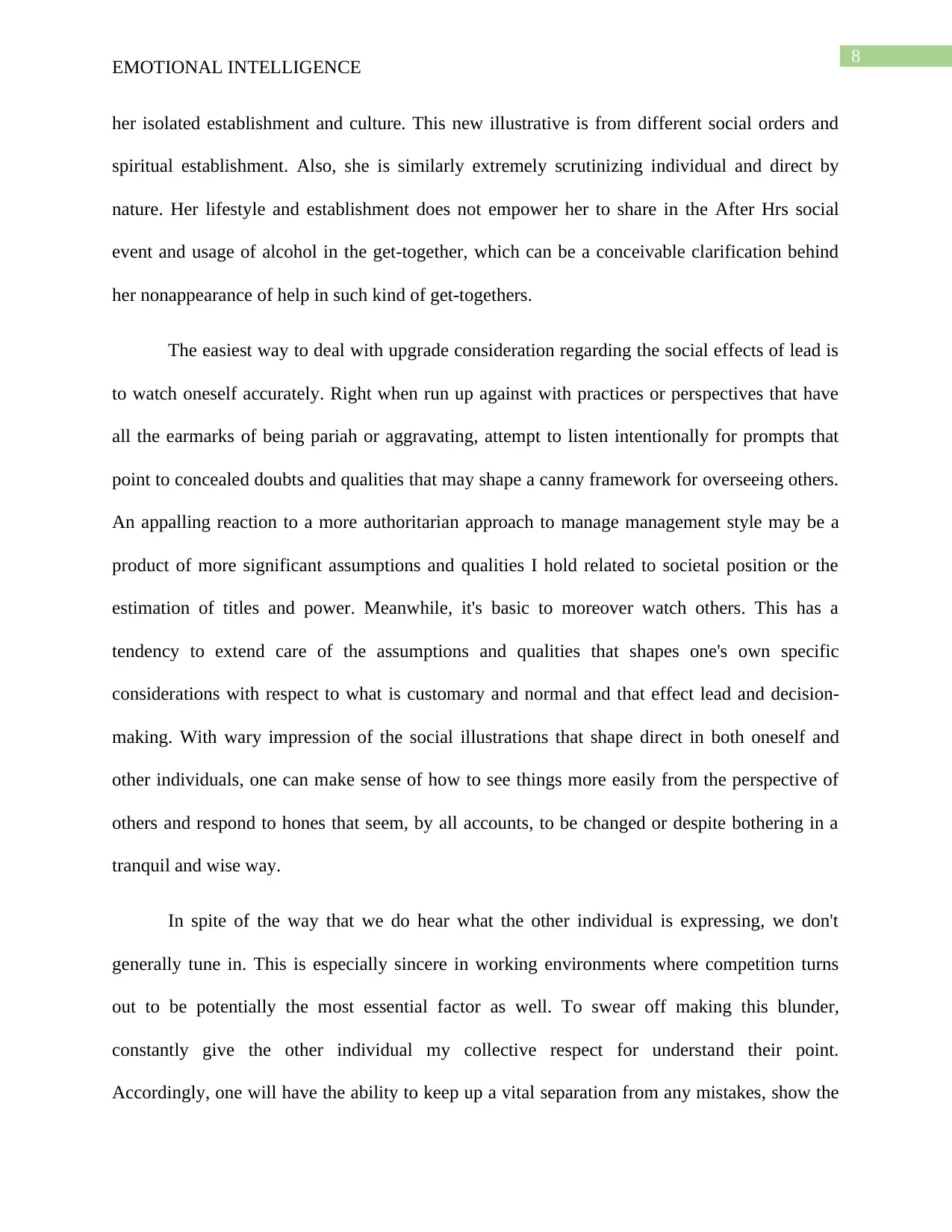
8
EMOTIONAL INTELLIGENCE
her isolated establishment and culture. This new illustrative is from different social orders and
spiritual establishment. Also, she is similarly extremely scrutinizing individual and direct by
nature. Her lifestyle and establishment does not empower her to share in the After Hrs social
event and usage of alcohol in the get-together, which can be a conceivable clarification behind
her nonappearance of help in such kind of get-togethers.
The easiest way to deal with upgrade consideration regarding the social effects of lead is
to watch oneself accurately. Right when run up against with practices or perspectives that have
all the earmarks of being pariah or aggravating, attempt to listen intentionally for prompts that
point to concealed doubts and qualities that may shape a canny framework for overseeing others.
An appalling reaction to a more authoritarian approach to manage management style may be a
product of more significant assumptions and qualities I hold related to societal position or the
estimation of titles and power. Meanwhile, it's basic to moreover watch others. This has a
tendency to extend care of the assumptions and qualities that shapes one's own specific
considerations with respect to what is customary and normal and that effect lead and decision-
making. With wary impression of the social illustrations that shape direct in both oneself and
other individuals, one can make sense of how to see things more easily from the perspective of
others and respond to hones that seem, by all accounts, to be changed or despite bothering in a
tranquil and wise way.
In spite of the way that we do hear what the other individual is expressing, we don't
generally tune in. This is especially sincere in working environments where competition turns
out to be potentially the most essential factor as well. To swear off making this blunder,
constantly give the other individual my collective respect for understand their point.
Accordingly, one will have the ability to keep up a vital separation from any mistakes, show the
EMOTIONAL INTELLIGENCE
her isolated establishment and culture. This new illustrative is from different social orders and
spiritual establishment. Also, she is similarly extremely scrutinizing individual and direct by
nature. Her lifestyle and establishment does not empower her to share in the After Hrs social
event and usage of alcohol in the get-together, which can be a conceivable clarification behind
her nonappearance of help in such kind of get-togethers.
The easiest way to deal with upgrade consideration regarding the social effects of lead is
to watch oneself accurately. Right when run up against with practices or perspectives that have
all the earmarks of being pariah or aggravating, attempt to listen intentionally for prompts that
point to concealed doubts and qualities that may shape a canny framework for overseeing others.
An appalling reaction to a more authoritarian approach to manage management style may be a
product of more significant assumptions and qualities I hold related to societal position or the
estimation of titles and power. Meanwhile, it's basic to moreover watch others. This has a
tendency to extend care of the assumptions and qualities that shapes one's own specific
considerations with respect to what is customary and normal and that effect lead and decision-
making. With wary impression of the social illustrations that shape direct in both oneself and
other individuals, one can make sense of how to see things more easily from the perspective of
others and respond to hones that seem, by all accounts, to be changed or despite bothering in a
tranquil and wise way.
In spite of the way that we do hear what the other individual is expressing, we don't
generally tune in. This is especially sincere in working environments where competition turns
out to be potentially the most essential factor as well. To swear off making this blunder,
constantly give the other individual my collective respect for understand their point.
Accordingly, one will have the ability to keep up a vital separation from any mistakes, show the
⊘ This is a preview!⊘
Do you want full access?
Subscribe today to unlock all pages.

Trusted by 1+ million students worldwide
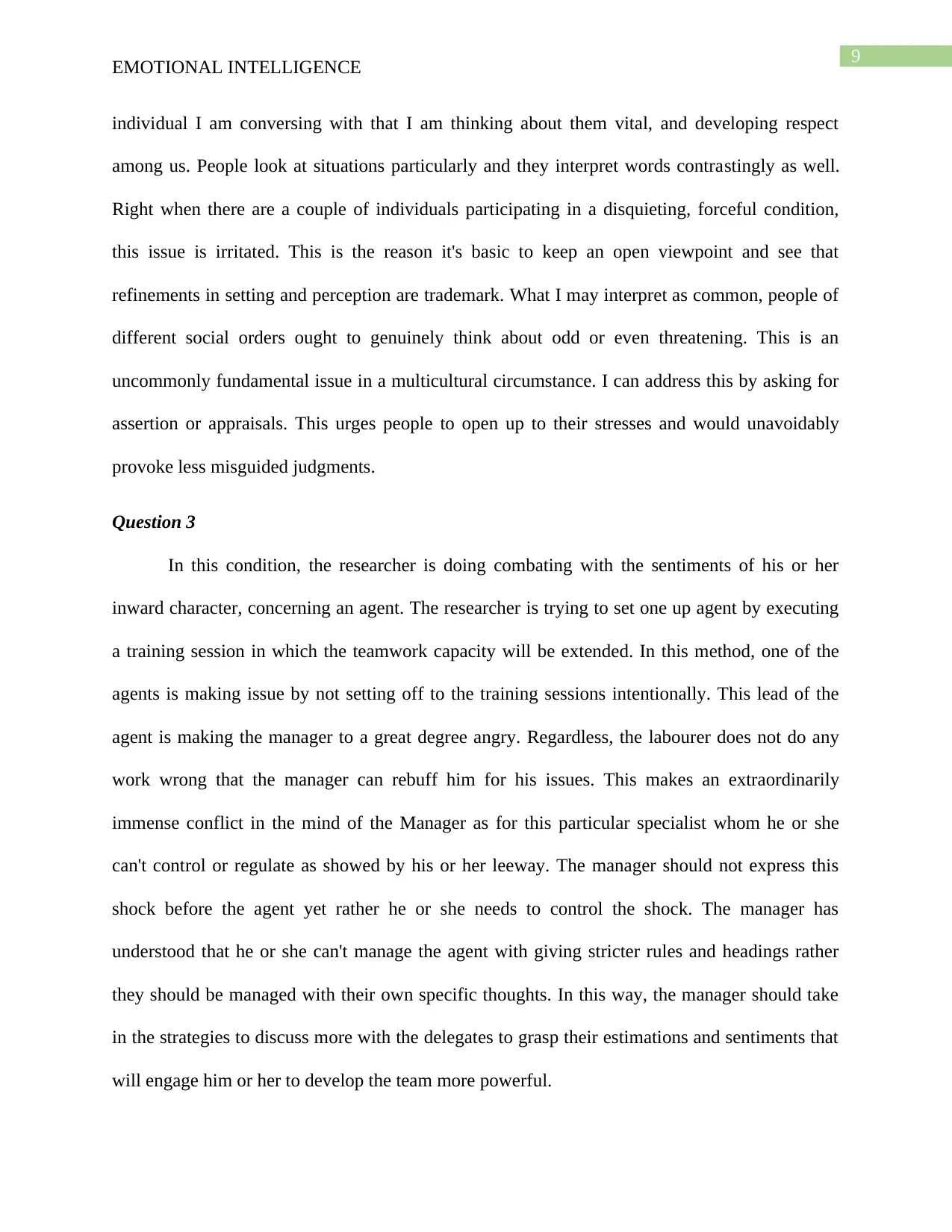
9
EMOTIONAL INTELLIGENCE
individual I am conversing with that I am thinking about them vital, and developing respect
among us. People look at situations particularly and they interpret words contrastingly as well.
Right when there are a couple of individuals participating in a disquieting, forceful condition,
this issue is irritated. This is the reason it's basic to keep an open viewpoint and see that
refinements in setting and perception are trademark. What I may interpret as common, people of
different social orders ought to genuinely think about odd or even threatening. This is an
uncommonly fundamental issue in a multicultural circumstance. I can address this by asking for
assertion or appraisals. This urges people to open up to their stresses and would unavoidably
provoke less misguided judgments.
Question 3
In this condition, the researcher is doing combating with the sentiments of his or her
inward character, concerning an agent. The researcher is trying to set one up agent by executing
a training session in which the teamwork capacity will be extended. In this method, one of the
agents is making issue by not setting off to the training sessions intentionally. This lead of the
agent is making the manager to a great degree angry. Regardless, the labourer does not do any
work wrong that the manager can rebuff him for his issues. This makes an extraordinarily
immense conflict in the mind of the Manager as for this particular specialist whom he or she
can't control or regulate as showed by his or her leeway. The manager should not express this
shock before the agent yet rather he or she needs to control the shock. The manager has
understood that he or she can't manage the agent with giving stricter rules and headings rather
they should be managed with their own specific thoughts. In this way, the manager should take
in the strategies to discuss more with the delegates to grasp their estimations and sentiments that
will engage him or her to develop the team more powerful.
EMOTIONAL INTELLIGENCE
individual I am conversing with that I am thinking about them vital, and developing respect
among us. People look at situations particularly and they interpret words contrastingly as well.
Right when there are a couple of individuals participating in a disquieting, forceful condition,
this issue is irritated. This is the reason it's basic to keep an open viewpoint and see that
refinements in setting and perception are trademark. What I may interpret as common, people of
different social orders ought to genuinely think about odd or even threatening. This is an
uncommonly fundamental issue in a multicultural circumstance. I can address this by asking for
assertion or appraisals. This urges people to open up to their stresses and would unavoidably
provoke less misguided judgments.
Question 3
In this condition, the researcher is doing combating with the sentiments of his or her
inward character, concerning an agent. The researcher is trying to set one up agent by executing
a training session in which the teamwork capacity will be extended. In this method, one of the
agents is making issue by not setting off to the training sessions intentionally. This lead of the
agent is making the manager to a great degree angry. Regardless, the labourer does not do any
work wrong that the manager can rebuff him for his issues. This makes an extraordinarily
immense conflict in the mind of the Manager as for this particular specialist whom he or she
can't control or regulate as showed by his or her leeway. The manager should not express this
shock before the agent yet rather he or she needs to control the shock. The manager has
understood that he or she can't manage the agent with giving stricter rules and headings rather
they should be managed with their own specific thoughts. In this way, the manager should take
in the strategies to discuss more with the delegates to grasp their estimations and sentiments that
will engage him or her to develop the team more powerful.
Paraphrase This Document
Need a fresh take? Get an instant paraphrase of this document with our AI Paraphraser
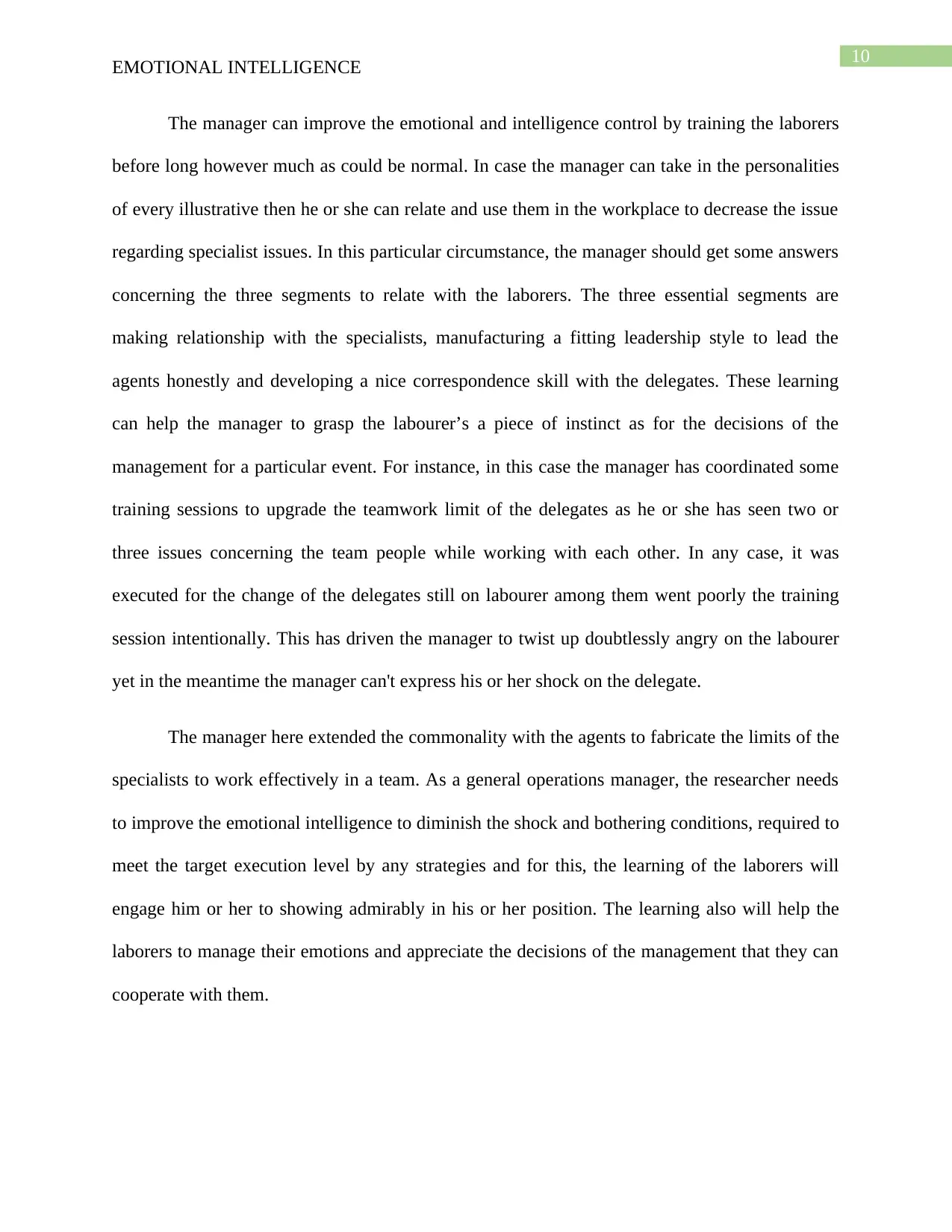
10
EMOTIONAL INTELLIGENCE
The manager can improve the emotional and intelligence control by training the laborers
before long however much as could be normal. In case the manager can take in the personalities
of every illustrative then he or she can relate and use them in the workplace to decrease the issue
regarding specialist issues. In this particular circumstance, the manager should get some answers
concerning the three segments to relate with the laborers. The three essential segments are
making relationship with the specialists, manufacturing a fitting leadership style to lead the
agents honestly and developing a nice correspondence skill with the delegates. These learning
can help the manager to grasp the labourer’s a piece of instinct as for the decisions of the
management for a particular event. For instance, in this case the manager has coordinated some
training sessions to upgrade the teamwork limit of the delegates as he or she has seen two or
three issues concerning the team people while working with each other. In any case, it was
executed for the change of the delegates still on labourer among them went poorly the training
session intentionally. This has driven the manager to twist up doubtlessly angry on the labourer
yet in the meantime the manager can't express his or her shock on the delegate.
The manager here extended the commonality with the agents to fabricate the limits of the
specialists to work effectively in a team. As a general operations manager, the researcher needs
to improve the emotional intelligence to diminish the shock and bothering conditions, required to
meet the target execution level by any strategies and for this, the learning of the laborers will
engage him or her to showing admirably in his or her position. The learning also will help the
laborers to manage their emotions and appreciate the decisions of the management that they can
cooperate with them.
EMOTIONAL INTELLIGENCE
The manager can improve the emotional and intelligence control by training the laborers
before long however much as could be normal. In case the manager can take in the personalities
of every illustrative then he or she can relate and use them in the workplace to decrease the issue
regarding specialist issues. In this particular circumstance, the manager should get some answers
concerning the three segments to relate with the laborers. The three essential segments are
making relationship with the specialists, manufacturing a fitting leadership style to lead the
agents honestly and developing a nice correspondence skill with the delegates. These learning
can help the manager to grasp the labourer’s a piece of instinct as for the decisions of the
management for a particular event. For instance, in this case the manager has coordinated some
training sessions to upgrade the teamwork limit of the delegates as he or she has seen two or
three issues concerning the team people while working with each other. In any case, it was
executed for the change of the delegates still on labourer among them went poorly the training
session intentionally. This has driven the manager to twist up doubtlessly angry on the labourer
yet in the meantime the manager can't express his or her shock on the delegate.
The manager here extended the commonality with the agents to fabricate the limits of the
specialists to work effectively in a team. As a general operations manager, the researcher needs
to improve the emotional intelligence to diminish the shock and bothering conditions, required to
meet the target execution level by any strategies and for this, the learning of the laborers will
engage him or her to showing admirably in his or her position. The learning also will help the
laborers to manage their emotions and appreciate the decisions of the management that they can
cooperate with them.
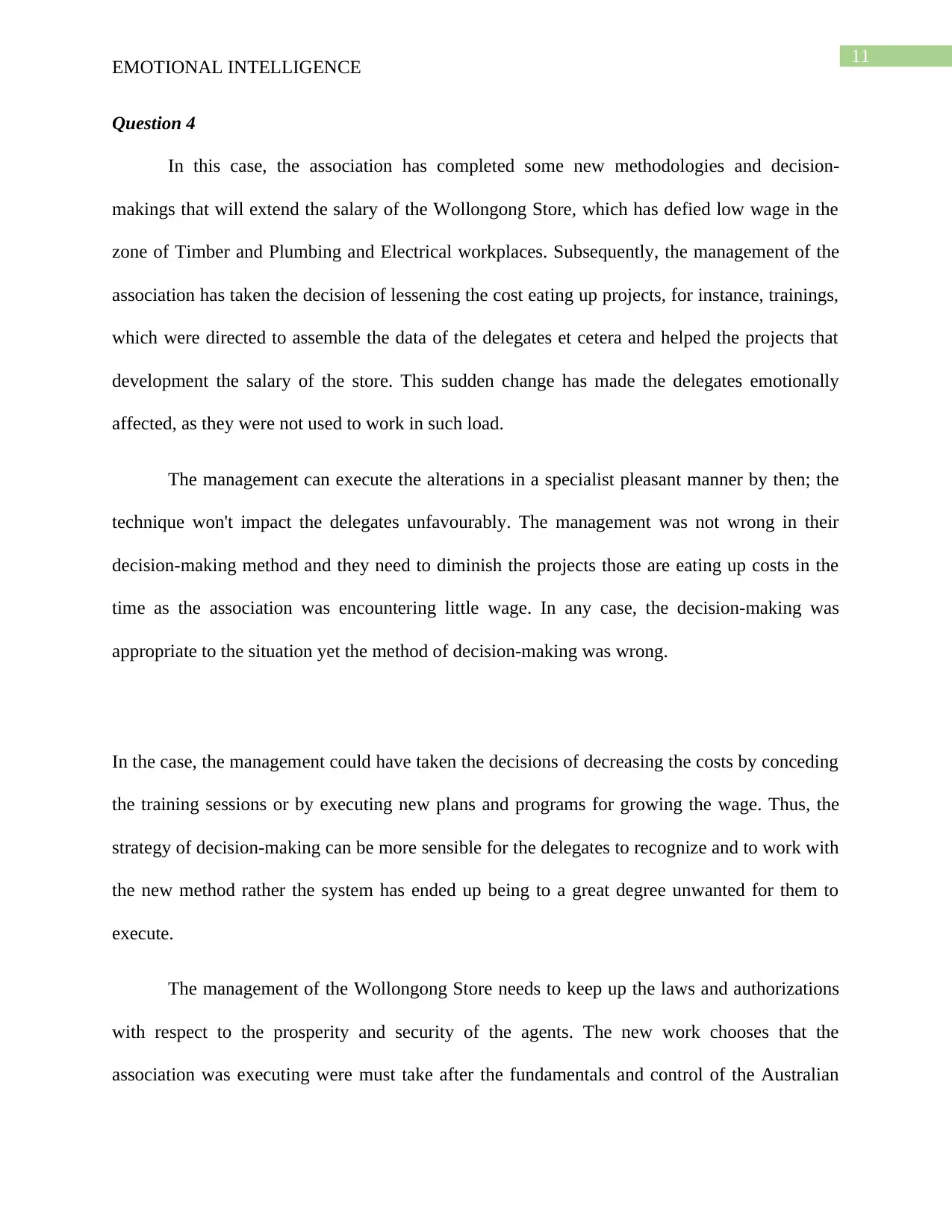
11
EMOTIONAL INTELLIGENCE
Question 4
In this case, the association has completed some new methodologies and decision-
makings that will extend the salary of the Wollongong Store, which has defied low wage in the
zone of Timber and Plumbing and Electrical workplaces. Subsequently, the management of the
association has taken the decision of lessening the cost eating up projects, for instance, trainings,
which were directed to assemble the data of the delegates et cetera and helped the projects that
development the salary of the store. This sudden change has made the delegates emotionally
affected, as they were not used to work in such load.
The management can execute the alterations in a specialist pleasant manner by then; the
technique won't impact the delegates unfavourably. The management was not wrong in their
decision-making method and they need to diminish the projects those are eating up costs in the
time as the association was encountering little wage. In any case, the decision-making was
appropriate to the situation yet the method of decision-making was wrong.
In the case, the management could have taken the decisions of decreasing the costs by conceding
the training sessions or by executing new plans and programs for growing the wage. Thus, the
strategy of decision-making can be more sensible for the delegates to recognize and to work with
the new method rather the system has ended up being to a great degree unwanted for them to
execute.
The management of the Wollongong Store needs to keep up the laws and authorizations
with respect to the prosperity and security of the agents. The new work chooses that the
association was executing were must take after the fundamentals and control of the Australian
EMOTIONAL INTELLIGENCE
Question 4
In this case, the association has completed some new methodologies and decision-
makings that will extend the salary of the Wollongong Store, which has defied low wage in the
zone of Timber and Plumbing and Electrical workplaces. Subsequently, the management of the
association has taken the decision of lessening the cost eating up projects, for instance, trainings,
which were directed to assemble the data of the delegates et cetera and helped the projects that
development the salary of the store. This sudden change has made the delegates emotionally
affected, as they were not used to work in such load.
The management can execute the alterations in a specialist pleasant manner by then; the
technique won't impact the delegates unfavourably. The management was not wrong in their
decision-making method and they need to diminish the projects those are eating up costs in the
time as the association was encountering little wage. In any case, the decision-making was
appropriate to the situation yet the method of decision-making was wrong.
In the case, the management could have taken the decisions of decreasing the costs by conceding
the training sessions or by executing new plans and programs for growing the wage. Thus, the
strategy of decision-making can be more sensible for the delegates to recognize and to work with
the new method rather the system has ended up being to a great degree unwanted for them to
execute.
The management of the Wollongong Store needs to keep up the laws and authorizations
with respect to the prosperity and security of the agents. The new work chooses that the
association was executing were must take after the fundamentals and control of the Australian
⊘ This is a preview!⊘
Do you want full access?
Subscribe today to unlock all pages.

Trusted by 1+ million students worldwide
1 out of 18
Related Documents
Your All-in-One AI-Powered Toolkit for Academic Success.
+13062052269
info@desklib.com
Available 24*7 on WhatsApp / Email
![[object Object]](/_next/static/media/star-bottom.7253800d.svg)
Unlock your academic potential
Copyright © 2020–2026 A2Z Services. All Rights Reserved. Developed and managed by ZUCOL.




